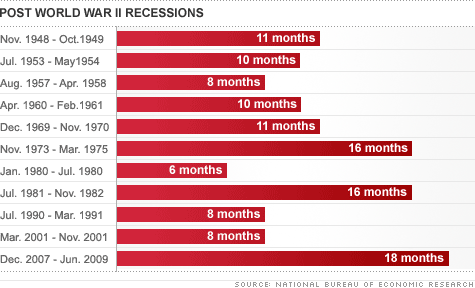
By Chris Isidore, senior writer September 20, 2010: 12:03 PM ET
NEW YORK (CNNMoney.com) -- The Great Recession ended in June 2009, according to the body charged with dating when economic downturns begin and end. But the news comes amid rising fears of a double-dip recession.
The National Bureau of Economic Research, an independent group of economists, released a statement Monday saying economic data now clearly points to the economy turning higher last summer.
That makes the 18-month recession that started in December 2007 the longest and deepest downturn for the U.S. economy since the Great Depression.
The NBER acknowledged the risk of double-dip recession in its statement, but said "The committee decided that any future downturn of the economy would be a new recession and not a continuation of the recession that began in December 2007. The basis for this decision was the length and strength of the recovery to date."
The committee that made the finding said it "did not conclude that economic conditions since that month have been favorable or that the economy has returned to operating at normal capacity." Rather, it decided that June was when the economy hit bottom, and that it has been slowly but steadily growing since then.
"Economic activity is typically below normal in the early stages of an expansion, and it sometimes remains so well into the expansion," said the NBER.
Most economists have been saying for months that the recession likely ended in the summer of 2009.
"No, we are not still in a recession as some people have asserted," said Barry Ritholtz, CEO of Fusion IQ, a research firm based in New York. "No, it's not a depression. The wheel has turned, the trough is more than a year behind us. This is not a robust recovery, but the economy is now expanding, not contracting."
Ritholtz places the risk of a double-dip recession in the 20%-30% range. Some other economists have put the risk as high as 40%. One of those is Sung Won Sohn, economics professor at Cal State University Channel Islands. He said the NBER determination that the recession ended more than a year ago does nothing to reduce his fears of another recession looming around the corner.
"The primary reason is we don't have any cylinder powering the economy," he said. "It's hard to imagine where the strength comes from."
The NBER typically takes a long time to declare the start and end of recessions, waiting for all the economic data to be revised and finalized and making sure that any change in direction of the economy is long-lasting. It didn't declare that the recession started in December of 2007 until a year later.
In addition to looking at gross domestic product, the broadest measure of the nation's economic health, the NBER also weighs employment, industrial production, income and sales for determining when the economy changes direction.
Many of those measures have weakened in recent months, even if they are still showing modest growth. That weakening is a key factor raising fears of a double dip.
Still, double-dip recessions are relatively rare. The last one occurred in the United States when the 1980 recession was followed by another in 1981-82. The NBER waited until July 1981 to declare the end of the 1980 recession, which turned out to be the same month that it eventually determined the next recession had begun.
Resource: CNN
Recession officially ended in June 2009
 9/21/2010 12:52:00 AM
|
Info,
Preparing For Next Recession
|
0
comments »
9/21/2010 12:52:00 AM
|
Info,
Preparing For Next Recession
|
0
comments »
Subscribe to:
Post Comments (Atom)




0 comments
Post a Comment